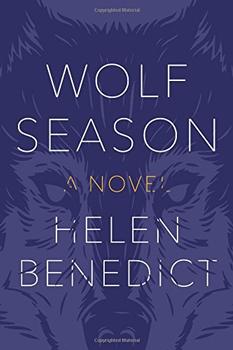Summary | Excerpt | Reviews | Beyond the book | Read-Alikes | Genres & Themes | Author Bio

There is so much to glean from Jiang Rong's
sprawling semi-autobiographical novel that it's
tempting to suggest a second read, if not the whole
book, at least parts of it. Ostensibly it is about a
young Beijing student, Chen Zhen, who is sent to
China's Inner Mongolia by the People's Revolution in
the 1960s to live among the nomads and herd sheep.
He lives with a handful of other students in a
typical Mongol yurt (a collapsible circular tent
made of animal skins), tends sheep, makes friends
with a couple of his peers among the Mongols and
cultivates a mentor-type connection with a Mongol
elder named Bilgee. Chen even adopts a wolf cub,
Little Cub, to raise as his own, hoping the
proximity will help him understand the complicated
relationship between man and wolf in this alien and
often-inhospitable territory.
That would be a fine story in itself. However, Jiang
didn't win the coveted literary Man Asia prize for
writing a "fine story." That's just the surface, the
top layer, the icing on the cake. The next layer
belongs to Jiang's extraordinary narrative
describing the incredible beauty that characterized
the vast Inner Mongolian grasslands, known as steppes, up until the 1960s:
"Spread out before him was a dark green basin…with layers of
mountain peaks to the east…Mountains of many colors
– dark and light green, brown deep red, purple –
rose in waves as far as one could see, to merge with
a mountain of pink clouds."
As well as the nearly uninhabitable conditions: "[The
mosquitoes'] wings never stopped moving, so fast
that only their bodies, the size of tiny shrimp,
were visible to the naked eye, and he suddenly felt
like a man who had sunk into a lake and was looking
up at vast schools of plankton."
Indeed, it would be no understatement to say that these descriptions give
the landscape as much of a role in the story as Bilgee, Little Wolf or even Chen himself. Truly, the
tale would be incomplete without knowing the lay of
this land as Chen saw it. Nor could the reader ever
begin to comprehend the tragic fate of the landscape
at the hands of shortsighted government officials.
The next layer revolves around Chen's education in
the fine art of, what is often called in the west,
resource management. As he is tutored by the wise
Bilgee in the history and customs of the Mongol
people (who share everything except a government
with the people of the Independent State of Mongolia
to the north) Chen becomes keenly aware of the
delicate balance, the tightrope dance, that sustains
our - human, beast and land - mutual existence.
These are some of the richest and at the same time,
most tedious, passages since the characters'
monologues often resemble prepared political
speeches. That notwithstanding, however, we can all
do with a reminder about the importance of
respecting and not abusing our planet.
Jiang, a former political prisoner, has some severe
criticism for the way his government has handled
positioning China as a player in the 21st
Century. Some of which we're aware of due to the
increased spotlight on Beijing as a result of last
year's Olympics. For example, the thoughtless
desertification of the Mongolian grasslands has
caused waves of yellow dust to dangerously pollute
the air in Beijing. Additionally, he highlights the
way the Chinese government handles the ethnic
differences between Mongols (nomadic descendents of
Genghis Khan) and the Han Chinese (agrarian
Confucians who comprise over 90% of the country's
population).
Although Jiang has taken criticism in other reviews
for underdeveloped characters, there is no need to
develop them further. So what if, aside from Chen,
Bilgee, Little Cub and the landscape, the others are
distinctly 2-D? The story is told. The points are
made. Powerfully. Jiang's recollections of his time
on the steppes of Inner Mongolia are tinged with the
sweetness of youth remembered. His environmental,
ethnic and political statements stand as bold as the
wolf itself.
About the Author
Jiang Rong is the pseudonym of Lu Jiamin (in Chinese, the family name comes
first).
To protect himself from what he describes as "the least liberal country
in the world", he wrote Wolf Totem under a pen-name and carefully
hid his real identity. It was not until he won the Man Asia prize in 2007,
three years after the book was first published, that anyone outside a small
circle of friends knew what Jiang looked like. Before the Man Booker prize
he had given interviews but never allowed his photograph to be taken. Some
critics have dismissed this as a marketing gimmick but for Jiang it was a matter
of survival. Speaking after the Man Asia prize was announced he says .....
continued at BookBrowse.
![]() This review was originally published in The BookBrowse Review in April 2008, and has been updated for the
April 2009 edition.
Click here to go to this issue.
This review was originally published in The BookBrowse Review in April 2008, and has been updated for the
April 2009 edition.
Click here to go to this issue.

If you liked Wolf Totem, try these:

by Louise Callaghan
Published 2021
Father of Lions is the powerful true story of the evacuation of the Mosul Zoo, featuring Abu Laith the zookeeper, Simba the lion cub, Lula the bear, and countless others, faithfully depicted by acclaimed, award-winning journalist Louise Callaghan in her trade publishing debut.

by Helen Benedict
Published 2017
After a hurricane devastates a small town in upstate New York, the lives of three women and their young children are irrevocably changed.
Your guide toexceptional books
BookBrowse seeks out and recommends the best in contemporary fiction and nonfiction—books that not only engage and entertain but also deepen our understanding of ourselves and the world around us.